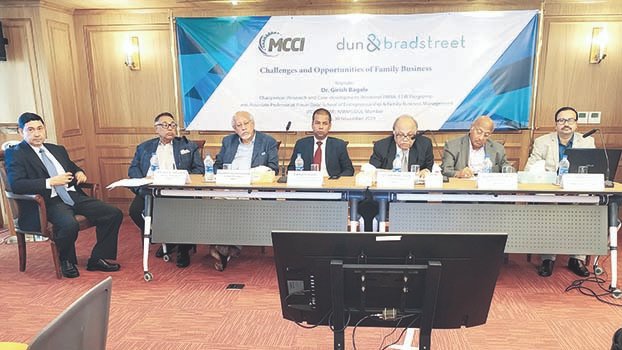MCCI to take business environment to newer heights


Metropolitan Chamber of Commerce and Industry, Dhaka (MCCI), in collaboration with Dun & Bradstreet South Asia Middle East Ltd., organized a discussion on “Challenges and Opportunities of Family Business” on Saturday at its office, Gulshan in the capital.
The discussion focused on succession plan and family constitution and the challenges and opportunities the family businesses faced. MCCI Vice-President Golam Mainuddin chaired the session.
Dr. Girish Bagale, Chairperson (Research and Case-development, Weekend-FMBA, ETW Programs) and Associate Professor at Pravin Dalal School of Entrepreneurship & Family Business Management, Narsee Monjee Institute of Management Studies (DU), Mumbai, delivered the Keynote Presentation.
In his introductory remarks, Golam Mainuddin pointed out that family businesses in Bangladesh were growing at a rate higher than the international average despite facing many challenges in the areas of skill and efficiency, innovation, domestic competition, rising prices of energy, raw materials, etc. Bangladesh must, therefore, look for ways to ensure that they flourish optimally, he said.
He also praised local family businesses like Square Group, Transcom Group, ACI group, Rahimafrooz Group, or Apex group for setting fine examples.
He assured of MCCI’s continued commitment to developing family businesses and taking the overall business environment of the country to newer heights.
Siddhartha Biswas, Vice President & Head-South Asia, Dun & Bradstreet South Asia Middle East Ltd., first gave a brief idea of Dun & Bradstreet’s activities. Later, he stated that Bangladesh was growing at a remarkable rate and would soon emerge as a leading global economy. However, it would have to ensure diversifying into other industries and come out of the RMG-centric dependence to maintain the success, he said.
In his keynote presentation, Dr. Bagale mentioned that issues such as owner’s death, a lack of interest on the part of the successors, and the involvement of the spouses of the next-generation family members could often determine the sustainability of a family business.
Dr. Bagale also pointed out that most family businesses did not survive beyond the 3rd generation. Hence, in order to ensure success, family businesses required a thorough understanding of the complexities involved and different sets of strategies than non-family businesses. He recommended having clear succession plans and advisory boards for ensuring the best performance of family businesses.


